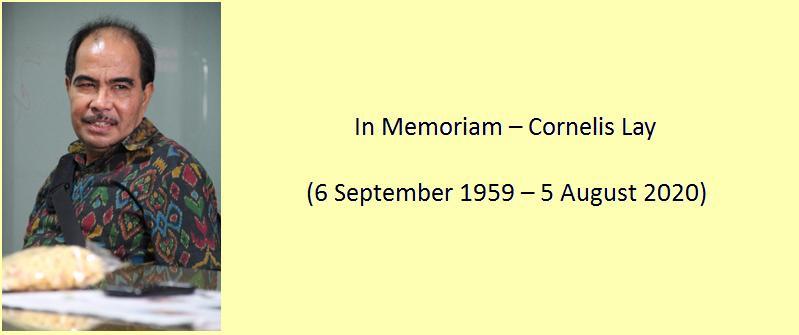
06 Aug In Memoriam – Cornelis Lay (6 September 1959 – 5 August 2020)
Conny Lay was born in a lower-class suburb of Kupang, a sleepy provincial town in the far East of the Indonesian archipelago. His parents ran a roadside stall. Mum slipped spare coins into a bamboo pole for her son´s education. She talked a distant rich relative into writing him a good reference. That is how he made it to Gadjah Mada University in faraway Yogakarta in 1979.
Gratitude for that escape from poverty through schooling coloured all his work. After graduating in 1987 he joined the staff at Political Science. Intellectuals ought to be “like Nokia, connecting people,” he often quipped. The arrogance of the academic elite upset him. Upon becoming professor last year, he entitled his oration: “Three roles for an intellectual: the convergence of power and humanity.” The high-ranking officials in the audience heard him say that many of them had failed the test of their true calling. Turning their backs on common sense, he said, they had only demanded respect. One of the many newspaper obituaries the day he died recalls him telling an academic protege: “An intellectual can be wrong, but they must never be a fibber. If you don´t know, say it, don´t carry on as if you do.” Presidents Megawati and Joko Widodo both asked his advice. He gave it gladly and in total confidence.
Conny was an important member of the joint Dutch-Indonesian research consortium “In Search of Middle Indonesia” that KITLV coordinated 2006-2011. It was about middle classes in provincial towns. Kupang became one of our study sites. Sylvia Tidey wrote her PhD dissertation there, and I wrote a book about it. We both benefitted from his contacts. In 2010 he spent three months writing at KITLV. “Growing up in Kupang” became a chapter in a Middle Indonesia edited volume. He wanted to turn it into his memoirs, but it never happened. Linda Savirani, another Middle Indonesia PhD graduate, now plays much the same “connecting people” role at Gadjah Mada that Conny left behind.
The tobacco addiction that killed him far too soon came out of Indonesia´s smoke-filled academic culture of the 1980s and 90s. I first saw him in 1999, sitting on the floor in the midst of a large student gathering, analysing Milan Kundera’s “Book of Laughter and Forgetting.” Wearing jeans and T-shirt, he mixed literature with political ideas and personal existentialism. Without pretentions, yet utterly serious, he embodied all the reasons why any academic who cares for Indonesia came also to Gadjah Mada.
Gerry van Klinken




No Comments